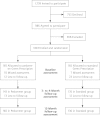Healthy Steps trial: pedometer-based advice and physical activity for low-active older adults
- PMID: 22585884
- PMCID: PMC3354969
- DOI: 10.1370/afm.1345
Healthy Steps trial: pedometer-based advice and physical activity for low-active older adults
Abstract
Purpose: We compared the effectiveness of 2 physical activity prescriptions delivered in primary care--the standard time-based Green Prescription and a pedometer step-based Green Prescription--on physical activity, body mass index (BMI), blood pressure, and quality of life in low-active older adults.
Methods: We undertook a randomized controlled trial involving 330 low-active older adults (aged =65 years) recruited through their primary care physicians' patient databases. Participants were randomized to either the pedometer step-based Green Prescription group (n = 165) or the standard Green Prescription group (n = 165). Both groups had a visit with the primary care practitioner and 3 telephone counseling sessions over 12 weeks aimed at increasing physical activity. Outcomes were the changes in physical activity (assessed with the Auckland Heart Study Physical Activity Questionnaire), blood pressure, BMI, quality of life (assessed with the 36-Item Short Form Health Survey), physical function status (assessed with the Short Physical Performance Battery), and falls over a 12-month period.
Results: Of the patients invited to participate, 57% responded. At 12 months, leisure walking increased by 49.6 min/wk for the pedometer Green Prescription compared with 28.1 min/wk for the standard Green Prescription (P=.03). For both groups, there were significant increases across all physical activity domains at 3 months (end of intervention) that were largely maintained after 12 months of follow-up. BMI did not change in either group. Significant improvements in blood pressure were observed for both groups without any differences between them.
Conclusions: Pedometer use resulted in a greater increase in leisure walking without any impact on overall activity level. All participants increased physical activity, and on average, their blood pressure decreased over 12 months, although the clinical relevance is unknown.
Figures
References
-
- Taylor AH, Cable NT, Faulkner G, Hillsdon M, Narici M, Van Der Bij AK. Physical activity and older adults: a review of health benefits and the effectiveness of interventions. J Sports Sci. 2004;22(8):703–725 - PubMed
-
- Centers for Disease Control and Prevention Physical Activity and Health: A Report for the Surgeon General. Atlanta, GA: US Department of Health and Human Services, Centers for Disease Control and Prevention, National Center for Chronic Disease Prevention and Health Promotion; 1996
-
- Simons LA, Simons J, McCallum J, Friedlander Y. Lifestyle factors and risk of dementia: Dubbo Study of the elderly. Med J Aust. 2006; 184(2):68–70 - PubMed
-
- Singh NA, Clements KM, Singh MA. The efficacy of exercise as a long-term antidepressant in elderly subjects: a randomized controlled trial. J Gerontol A Bio Sci Med Sci. 2001;56(8):M2349–M2356 - PubMed
Publication types
MeSH terms
LinkOut - more resources
Full Text Sources
Medical

